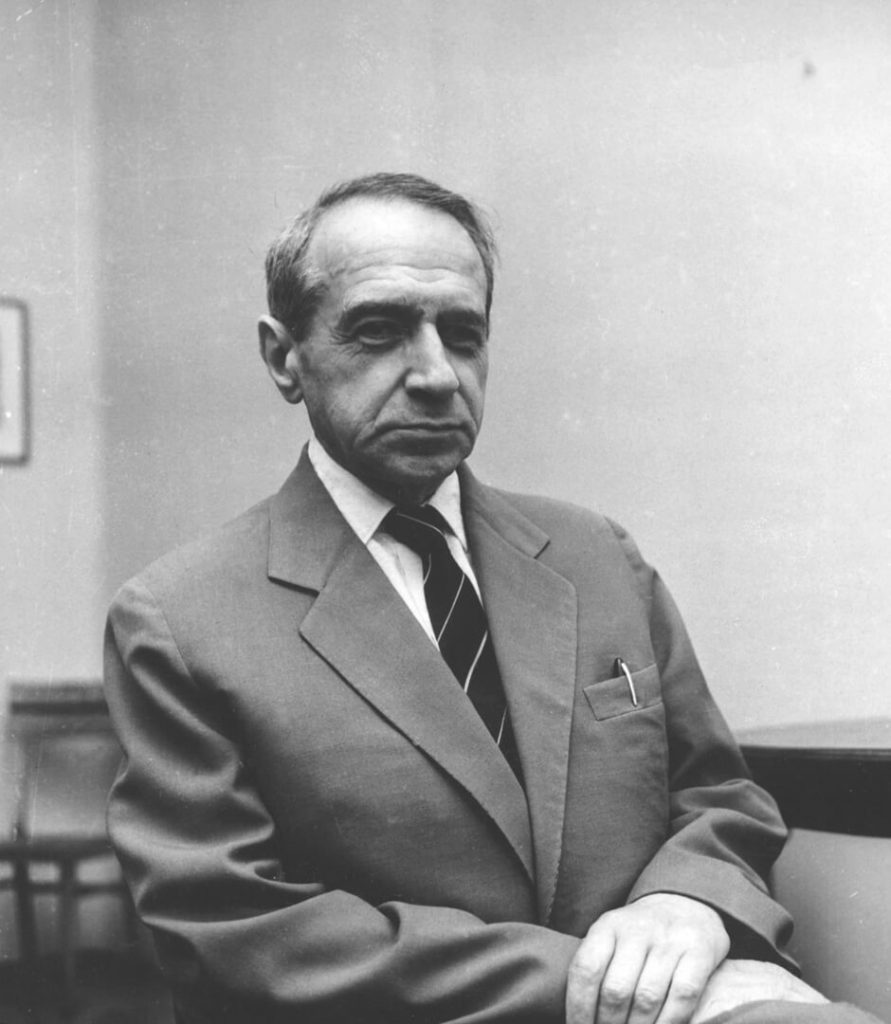More languages
More actions
No edit summary Tag: Visual edit |
General-KJ (talk | contribs) m (Added blue links and category) Tag: Visual edit |
||
| (2 intermediate revisions by one other user not shown) | |||
| Line 1: | Line 1: | ||
{{Infobox politician|name=Michał Kalecki|birth_name=Michał Kalecki|birth_date=22 June 1899|birth_place=Łódź, Congress Poland|death_date=18 April 1970|death_place=Warsaw, Polish People's Republic|image=File:Michal-Kalecki-1-891x1024.png}} | {{Infobox politician|name=Michał Kalecki|birth_name=Michał Kalecki|birth_date=22 June 1899|birth_place=Łódź, [[Congress Poland]]|death_date=18 April 1970|death_place=[[Warsaw]], [[Polish People's Republic]]|nationality=Polish|political_orientation=[[Marxism-Leninism]] | ||
([[Neo-Marxism]] alledgly)|political_party=[[Polish United Workers' Party]]|image=File:Michal-Kalecki-1-891x1024.png}} | |||
'''Michał Kalecki''' (<small>Polish pronunciation:</small> [ˈmixaw kaˈlɛt͡skʲi]; 22 June 1899 – 18 April 1970) was a [[Republic of Poland|Polish]] [[Marxism|Marxian]] economist. Over the course of his life, Kalecki worked at the London School of Economics, University of Cambridge, University of Oxford and Warsaw School of Economics and was an economic advisor to the governments of [[Republic of Poland|Poland]], [[French Republic|France]], [[Republic of Cuba|Cuba]], [[State of Israel|Israel]], [[Mexican United States|Mexico]] and [[Republic of India|India]]. He also served as the deputy director of the [[United Nations]] Economic Department in [[New York City]]. | |||
Kalecki has been called "one of the most distinguished economists of the 20th century" and "likely the most original one". It is often claimed that he developed many of the same ideas as [[John Maynard Keynes]] before Keynes, but he remains much less known to the English-speaking world. He offered a synthesis that integrated Marxist class analysis and the new literature on oligopoly theory, and his work had a significant influence on both the [[neo-Marxian]] (''Monopoly Capital'')<ref>{{Citation|author=Jonathan Nitzan and Shimshon Bichler|year=2009|title=Capital as power: a study of order and creorder.|chapter=pp. 50–51.|publisher=Taylor & Francis}}</ref> and post-Keynesian schools of economic thought. He was one of the first macroeconomists to apply mathematical models and statistical data to economic questions. Being also a political economist and a person of leftist convictions, Kalecki emphasized the social aspects and consequences of economic policies. <ref>{{Web citation|author=Jan Toporowski|newspaper=World Economics Association Newsletters|title=Michal Kalecki's legacy, an interview with Jan Toporowski Kalecki's legacy.|date=2014-2-1}}</ref> | |||
Kalecki has been called "one of the most distinguished economists of the 20th century" and "likely the most original one". It is often claimed that he developed many of the same ideas as John Maynard Keynes before Keynes, but he remains much less known to the English-speaking world. He offered a synthesis that integrated Marxist class analysis and the new literature on oligopoly theory, and his work had a significant influence on both the neo-Marxian (''Monopoly Capital'')<ref>{{Citation|author=Jonathan Nitzan and Shimshon Bichler|year=2009|title=Capital as power: a study of order and creorder.|chapter=pp. 50–51.|publisher=Taylor & Francis}}</ref> and post-Keynesian schools of economic thought. He was one of the first macroeconomists to apply mathematical models and statistical data to economic questions. Being also a political economist and a person of leftist convictions, Kalecki emphasized the social aspects and consequences of economic policies. <ref>{{Web citation|author=Jan Toporowski|newspaper=World Economics Association Newsletters|title=Michal Kalecki's legacy, an interview with Jan Toporowski Kalecki's legacy.|date=2014-2-1}}</ref> | |||
Kalecki made major theoretical and practical contributions in the areas of the business cycle, growth, full employment, income distribution, the political boom cycle, the oligopolistic economy, and risk. Among his other significant interests were monetary issues, economic development, finance, interest, and inflation. In 1970, Kalecki was nominated for the Nobel Memorial Prize in Economics, but he died the same year. | Kalecki made major theoretical and practical contributions in the areas of the business cycle, growth, full employment, income distribution, the political boom cycle, the oligopolistic economy, and risk. Among his other significant interests were monetary issues, economic development, finance, interest, and inflation. In 1970, Kalecki was nominated for the Nobel Memorial Prize in Economics, but he died the same year. | ||
| Line 9: | Line 9: | ||
==References== | ==References== | ||
<references /> | <references /> | ||
[[Category:Economists]] | |||
[[Category:Marxist economists]] | |||
Latest revision as of 11:51, 10 October 2024
Michał Kalecki | |
|---|---|
 | |
| Born | Michał Kalecki 22 June 1899 Łódź, Congress Poland |
| Died | 18 April 1970 Warsaw, Polish People's Republic |
| Nationality | Polish |
| Political orientation | Marxism-Leninism (Neo-Marxism alledgly) |
| Political party | Polish United Workers' Party |
Michał Kalecki (Polish pronunciation: [ˈmixaw kaˈlɛt͡skʲi]; 22 June 1899 – 18 April 1970) was a Polish Marxian economist. Over the course of his life, Kalecki worked at the London School of Economics, University of Cambridge, University of Oxford and Warsaw School of Economics and was an economic advisor to the governments of Poland, France, Cuba, Israel, Mexico and India. He also served as the deputy director of the United Nations Economic Department in New York City.
Kalecki has been called "one of the most distinguished economists of the 20th century" and "likely the most original one". It is often claimed that he developed many of the same ideas as John Maynard Keynes before Keynes, but he remains much less known to the English-speaking world. He offered a synthesis that integrated Marxist class analysis and the new literature on oligopoly theory, and his work had a significant influence on both the neo-Marxian (Monopoly Capital)[1] and post-Keynesian schools of economic thought. He was one of the first macroeconomists to apply mathematical models and statistical data to economic questions. Being also a political economist and a person of leftist convictions, Kalecki emphasized the social aspects and consequences of economic policies. [2]
Kalecki made major theoretical and practical contributions in the areas of the business cycle, growth, full employment, income distribution, the political boom cycle, the oligopolistic economy, and risk. Among his other significant interests were monetary issues, economic development, finance, interest, and inflation. In 1970, Kalecki was nominated for the Nobel Memorial Prize in Economics, but he died the same year.
